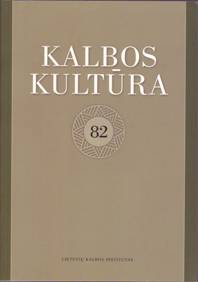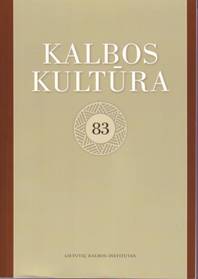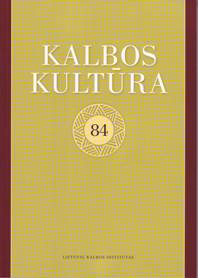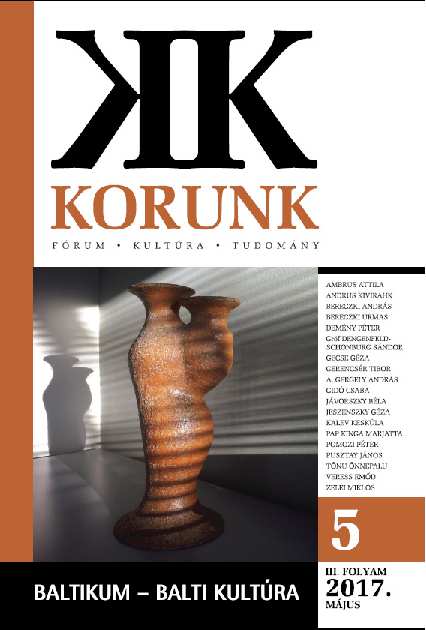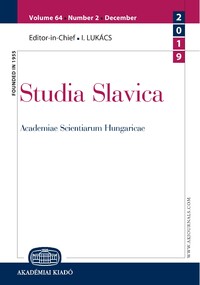Author(s): Rita Miliūnaitė / Language(s): Lithuanian
Issue: 89/2016
The accentuation history of the codification of the loanwords with semi-diphthongs el, er and diphthong eu demonstrates that their variant with the short vowel [ẹ] with the falling syllable accent was an artificial invasion of the sound and prosody system of Standard Lithuanian that was thrown out of joint especially by the appearance of the 1951 dictionary of the so-called international words. The most obvious consequences of this phenomenon in the present usage is the levelling up of syllable accents and the encouragement of movable stress, as well as different syllable accent marking in words of the same origin (e.g. temosas and tèrminis) that were included into the dictionaries at different time.
The theoretically declared originality of the [ẹ] in words of foreign origin is difficult to record practically, linguists’ attitude towards it is subjective and ordinary language users do pronunciation with the rising syllable accent of the above mentioned semi-diphthongs and diphthong eu i.e. the pronunciation and accentuation of loanwords are naturally adjusted to the sound and prosody system of the Lithuanian language. Therefore, at present there is a clear contradiction between usage and codification. Under such circumstances, the importance of codification grows: it becomes either a factor for preservation and stabilisation of rea norms, or an obstacle to their natural development.
The goal of the article is to analyse the codification state of loanwords with stressed el, er, eu that was created in the Lithuanian language at the beginning of the 21st century, and to define possible solutions to the change of the codification system. The following aims are set: 1) to discuss the usage criteria and its reliability in the codification of the phenomenon under discussion; 2) to examine the 2003 and 2014 recommendations of the institution that approves the norms of standard language – the State Lithuanian Language Commission (SLLC) – that concern the accentuation of el, er, eu, reveal their main points and purposefulness; 3) to deal with the codification issue of the loanwords with the stressed el, er, eu based on codification theory (codification strategic trends, correlation between competitive variants, principles and criteria of codification and its methods); 4) to asses the development of the possible solutions of codification and consequences of the phenomenon under discussion.
Drawing on these recommendations developed by the Language Commission in 2003 and 2014 concerning the accentuation of el, er, eu as well as the issue of their codification based on codification theory the article asserts that the Commission’s recommendations for accentuation took a reasonable measure to legalize the rising syllable accent of el, er, eu (for example, šefas, koncetas, terapeũtas, -ė) as a second variant of more frequently used loanwords where they were not codified. Since these recommendations are based on the tendencies of real usage and the rising syllable accent of el, er, eu variants has been accepted as standard, and corresponding with these tendencies, the strategic codification trend towards the system is clearly seen – the aim is to make the codification of these words with the rising syllable accent.
It is suitable to change the codification of separate words or their sub-systems through variants; also, theoretically, it could be suitable to bring the accentuation of the systemically higher level of loanwords with el, er, eu closer to real usage. However, until now the codification of these phenomena has not been uniform and was carried out at different time. Besides, the Language Commission’s recommendations encompass only more frequently used words, but not all that are included into the normative Dictionary of Standard Lithuanian that is being edited (it includes only a few borrowed proper nouns loanwords). There are many differently stressed variants, in various stages of change. Therefore, this method of codification to put the accentuation of loanwords with el, er, eu has so far not proved to be useful until now.
Codification theory and practice demonstrate that the most rational way out the present situation is to take the last step and to take a rational decision and to level up the codification system, so that all loanwords with el, er, eu, including new ones that will be accepted into the Lithuanian language are stressed with the circumflex accent according to the tendencies in real usage. Another one would be to leave an acute accent variant as the second one where it is a remnant of the earlier codification.
The normative Dictionary of Standard Lithuanian that is being edited, which the Language Commission is going to approve, presents the best opportunity to level up the accentuation system in order to eliminate the contradictions between usage and codification. In practice it means that in this dictionary the variant of the loanwords with el, er, eu that bear the circumflex accent should be universally considered as the first one and the main norm. In this way the language users’ expectations to have a clear accentuation system of such words would also be satisfied and they would not have to make sure in what stage of change through variants of codification this or that word is.
Note. While the article was being edited, on 17 June 2016, the State Lithuanian Language Commission passed the recommendation that the variant of loanwords with el, er, eu bearing the circumflex is to be systematically considered as the main stressed variant in the Dictionary of Standard Lithuanian i.e. to level up the accentuation system as has been suggested in this article.
More...
